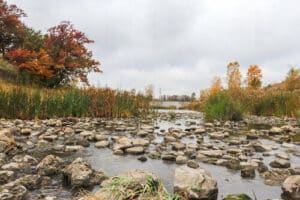We have a handful of noteworthy water-related news stories hand-picked for you by HRWC staff. Read on for the latest legal blow to the Clean Water Act as well as exciting news about funding for dam removal in the Huron River watershed. Our June News to Us also shares how to keep thirsty trees alive in dry spells and the science behind summer fish kills.
16 Michigan dam removal, repair projects split $15.3M in grants
The Michigan Department of Environment, Great Lakes, and Energy (EGLE) recently announced $15.3 million in grants to remove and repair dams across the state. A portion of the Dam Risk Reduction Grant Program funding will support a trio of dam removal projects across the Huron River watershed, including the Peninsular Paper Dam in Ypsilanti and the Tyler and Beyer dams on Willow Run Creek. To learn more about the process of removing a dam, please read a recent blog from guest blogger Janeen McDermott, PE. For more information on the Peninsular Paper Dam removal project, click here.

Supreme Court erases protections for most wetlands
In late May, the Supreme Court released a major ruling significantly curtailing the Clean Water Act. In its 5-4 Sackett v. EPA ruling, SCOTUS dramatically narrowed the reach of federal clean water protections. Most significantly, the court’s decision shrinks the Clean Water Act’s protection of wetlands, marshes, and bogs to only those “with a continuous surface water connection” to larger streams, lakes, and rivers. To learn about the implications of Sackett v. EPA for Michigan, read a recent article from Planet Detroit or head to HRWC’s blog Supreme Court Dismantles Core Wetland Protections in Clean Water Act. In summary, Michigan’s wetlands will still receive protections under the state’s Natural Resources and Environmental Protection Act.
Your trees need a little love (and water) during dry spells this summer
If you recently planted a tree, make sure it is getting plenty of water amidst the scorching summer weather. According to foresters from the Michigan Department of Natural Resources, tress planted in the past year need at least 10 to 20 gallons of water a week until regular rain returns. The consistent water helps new trees set roots and maintain resistance to disease and insect damage. For more information on the stormwater benefits of your trees as well as the climate change impacts on tree species in the Huron River watershed, visit our Take Action page.
EGLE warns about summer fish kills due to temperatures rising across Michigan
According to the Michigan Department of Environment, Great Lakes, and Energy, the hot and dry summer weather is likely to result in more frequent fish kills. Consistent high air temperatures warm surface water and result in low dissolved oxygen, which stresses fish such as perch, pike, bass, and bluegill. This is especially a concern in nutrient-rich lakes. If a fish kill is identified, EGLE encourages residents to note the location, take photos, and report it using the DNR’s Eyes in the Field observation reporting system.
More than half of the world’s largest lakes are shrinking. Here’s why that matters
According to a new study, lakes across the globe cumulatively lost 22 gigatonnes of water annually since 1992 due to climate change and human activities such as agriculture and development. With more than half of the world’s largest lakes and reservoirs shrinking, there is growing uncertainty around water supply for drinking, hydropower, and agriculture. Researchers hope the study’s findings will help inform sustainable water management and conservation.



